THOMAS HARDY
- 格式:ppt
- 大小:2.03 MB
- 文档页数:35
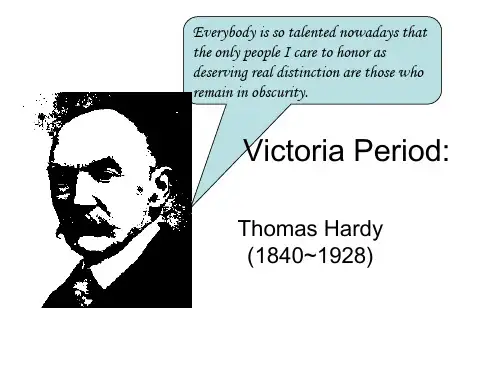
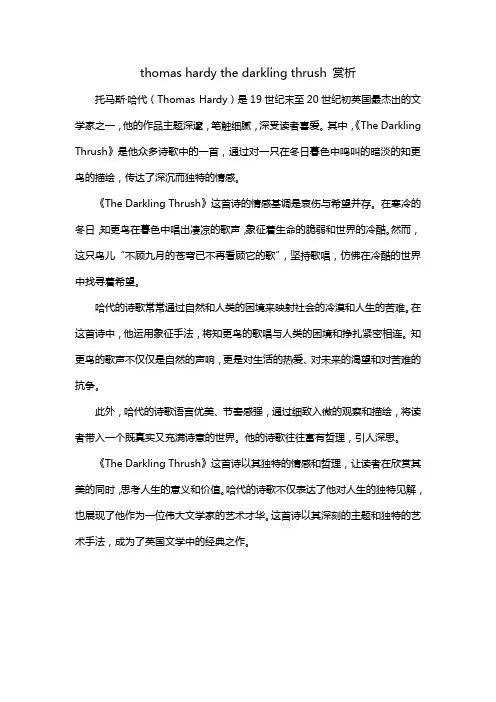
thomas hardy the darkling thrush 赏析
托马斯·哈代(Thomas Hardy)是19世纪末至20世纪初英国最杰出的文学家之一,他的作品主题深邃,笔触细腻,深受读者喜爱。
其中,《The Darkling Thrush》是他众多诗歌中的一首,通过对一只在冬日暮色中鸣叫的暗淡的知更鸟的描绘,传达了深沉而独特的情感。
《The Darkling Thrush》这首诗的情感基调是哀伤与希望并存。
在寒冷的冬日,知更鸟在暮色中唱出凄凉的歌声,象征着生命的脆弱和世界的冷酷。
然而,这只鸟儿“不顾九月的苍穹已不再看顾它的歌”,坚持歌唱,仿佛在冷酷的世界中找寻着希望。
哈代的诗歌常常通过自然和人类的困境来映射社会的冷漠和人生的苦难。
在这首诗中,他运用象征手法,将知更鸟的歌唱与人类的困境和挣扎紧密相连。
知更鸟的歌声不仅仅是自然的声响,更是对生活的热爱、对未来的渴望和对苦难的抗争。
此外,哈代的诗歌语言优美、节奏感强,通过细致入微的观察和描绘,将读者带入一个既真实又充满诗意的世界。
他的诗歌往往富有哲理,引人深思。
《The Darkling Thrush》这首诗以其独特的情感和哲理,让读者在欣赏其美的同时,思考人生的意义和价值。
哈代的诗歌不仅表达了他对人生的独特见解,也展现了他作为一位伟大文学家的艺术才华。
这首诗以其深刻的主题和独特的艺术手法,成为了英国文学中的经典之作。

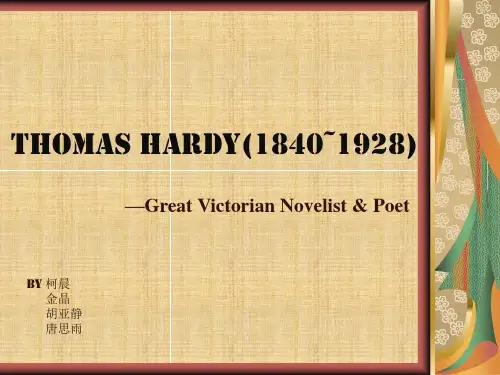
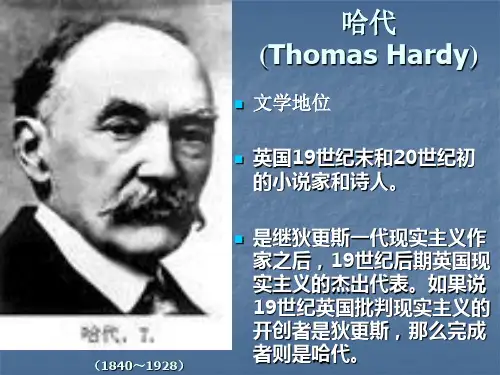
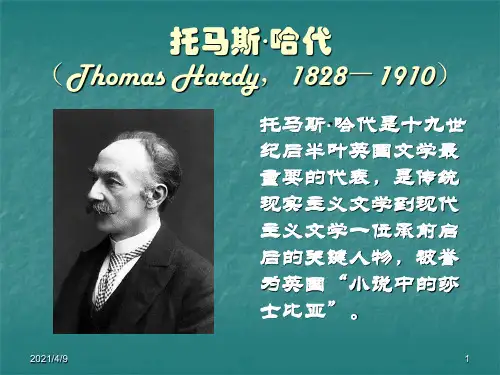
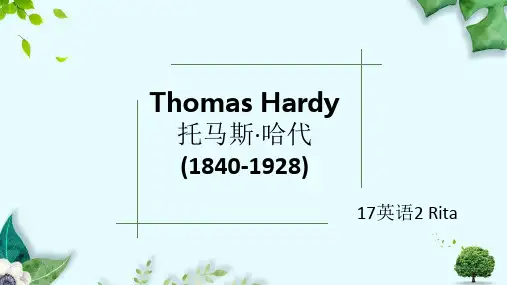


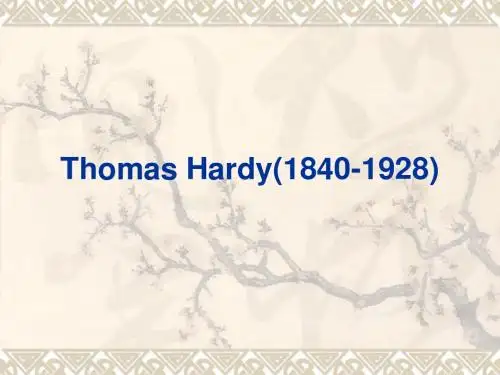
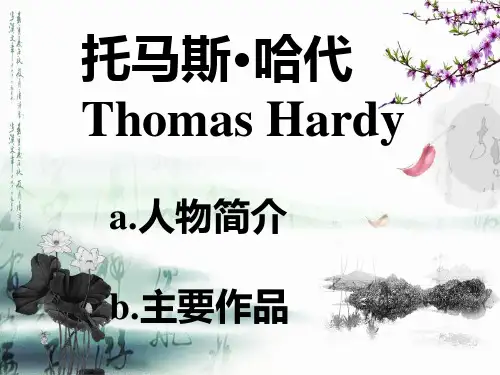
2010级12班王之宜201005421227Thomas HardyThomas Hardy (1840-1928) is in the last of the great Victorian novelist. Hardy was born in Dorset, southern England. Son of a builder, he became a builder himself. At the age of 22, he began to write poetry. He insisted in studying literature and philosophy by himself. Then in 1867, he began to write novels. While, for the last three decades of his life, he turned back to poetry and became one of the major Victorian poets. Hardy was the most pessimistic novelist of the Victorian Age. Life after 1870s became drastically different with drastic changes in mood and tenor. The age of Emile Zola’s naturalism had arrived. Hardy was apparently affected: the spirit of determinism characteristic of the naturalistic works of the period permeated his later novels as well. But Hardy is not a naturalistic writer. Hardy was a prolific writer. His Victorian novels were divided into 3 groups, novels of character and environment, romances and fantasies and novels of ingenuity. He also wrote short stories and post-Victorian poetry.In his early life, Hardy tried to write some poems but all of them were not published, so he began to write novels. Hardy's first novel, The Poor Man and The Lady, finished by 1867, but he failed to find a publisher. With the advices of his friend, he gave up trying to publish and destroy the manuscript. In 1871, he published his first novel Desperate Remedies, and then publishes Under the Greenwood Tree in 1872, A Pair of Blue Eyes in 1873. Hardy’s greatest nove ls are T ess of the D’Urbervilles,Jude the Obscure. And the former attracted criticism for its sympathetic portrayal of a "fallen woman" and was initially refused publication. Its subtitle, A Pure Woman: Faithfully Presented was intended to raise the eyebrows of the Victorian middle-classes. Unlike the novels of Charles Dickens and George Eliot, Hardy's novels do not beg to be filmed or to be adapted for the stage. Some scholars have suggested that this is due to the absence of flair in Hardy for the overtly dramatic.Naturalism and fatalism can be sensed everywhere by readers in his novels. His works capture the ethos of England, and contain symbolism, allusions as well ascombination of naturalism, realism and symbolism. Hardy is skillful in using nature and landscape to express human feelings. Hardy’s writing features lie in his determinist stance on the nature of life and the cosmos, his sharp sense of the humorous and absurd and his love and observation of the natural world with strong symbolic effect. H ardy’s stories are always moving and bewitching. He deviates consciously from traditional Victorian realism that emphasizes plot more than characterization. It is definitely to his credit that he manages to bring back to fiction a high sense of tragedy, th e Greek sense of fatality. What’s more, Hardy places emphasis on the deeper psychology of his characters. Hardy’s language possesses a silent power and charm. His prose is studded with rhetorical devices and poetic imagery, and is richly connotative. He is also famous for his uneven style. While there are some minor flaws in Hardy’s works-his ideas are not always clear, and his plots may occasionally jump and dislocate.The features in his novels cannot separate from his experience.Firstly,the source of his thoughts of destiny came from the great influence from his mother and grandmother in his childhood and the child memories greatly affected his future writing.Secondly,ancient Greek tragedies played a key role in the literary education he had got.The characters in his novel are quite different from those in ancient Greek tragedies,but they both have strong tragic flavor,no escape from destiny and strong sense of fatalism.The readers can taste the bitterness,pain,helplessness and unreasonable fate.Finally,the social causes of the thoughts of tragic destiny in Hardy s novels are explored as followed:the dark society,the gap between the poor and then rich and the invasion of capitalism into countryside driving many poor peasants into bankrupt and plights.So the unchangeable social reality and the social vicious power forced him into believing in fate and made him a tragic fatalist.Tess of the D’Urbervilles is Thomas Hardy’s great work which possesses a very important position in literary history of the world. Since it was born 100 years ago, it has attracted people’s attention and argument, in part because it challenged the sexual mores of Hardy's day. The story is about the tragic fate of Tess. Tess is a beautiful and pure girl at first, but her innocence and ignorance of sex caused her seduced by Alecand therefore she has no chastity. When Tess experiences physical, material and spiritual sufferings, Angel comes to Tess, caring her and loving her. He gives Tess great condors like an angel sending good news of God. However, when he knows Tess has been seduced by Alec, his attitude changes very drastically. He cannot forgive Tess and asks to stop the marriage. Then he leaves Tess. The pain he has brought to Tess is much more serious than that brought by Alec, and it is even fatal in some sense. Under the torment of the hate for Alec and the love for Angel, Tess falls into great despair and she stabs Alec and runs away with Angel. But she is finally arrested and hanged.The story reveals the spirit of determinist defeatism and enforces its shibboleth of predestination, and no amount of human effort can alter its design of darkness. Tess is a paragon of innocence. What she asks for life is simple enough: to be loved and happy. But she is not got it because she is at the mercies of the odds against her. (Two men must appear in her life to confuse and distract her. One is totally evil; the other apparently good. The two both serve as the instruments of Chance. So many coinc idences occur in Tess’ life that the hand of Chance is in evidence wherever she goes.) This novel is a mirror for the spirit of the time. Hardy describes his critical attitude towards the unjust treatment of women and his denunciation of the hypocrisy of the social structures a moral code of Victorian England.“Ache of modernism" is one theme of this novel, and this theme is notable in Tess, which, as one critic noted, portrays "the energy of traditional ways and the strength of the forces that are destroying them". His works focuses on the representation of the psychic ache that modern civilization brings on to man. They have a grave sense of crisis and bear strong affinity with the modernist literature. Angel's middle-class fastidiousness makes him reject Tess. When he parts from her and goes to Brazil, the handsome young man gets so ill that he is reduced to a "mere yellow skeleton". All these instances are typically interpreted as indications of the negative consequences of man's separation from nature, both in the creation of destructive machinery and in the inability to rejoice in pure nature. However, Marxist critic Raymond Williams in The English Novel from Dickens to Lawrence questions the identification of Tess with apeasantry destroyed by industrialism. Tess is not a peasant, she is a school educated member of the rural working class: she suffers a tragedy through being thwarted, in her aspirations to rise and her desire for a good life (among which is love and sex), not by "industrialism" but by the landed bourgeoisie (Alec), liberal idealism (Angel) and Christian moralism in her family's village.You can also find sexual double standard in this novel. Hardy criticizes certain social constraints that hindered the lives of those living in the 19th century. It was also moral conflict at that time when women were not allowed to have the same rights as men. Alec’s seduction of Tess destroys her happiness and brings her shame. But n o one thought that Alec was guilty but blamed Tess. Besides, Tess tried to be honest about her unfortunate past before the marriage, but following the order of fate, her husband didn’t read her letter. At the weeding day Angel confess he had done something bad at the past and gain forgive from his wife, while Tess told him her tragedy and gain discard from him. The body hurt from Alec and the physical hurt from Angel make the final tragedy to Tess.References:蔡健,《从女性主义批评解读苔丝的悲剧》,《南京航空航天大学学报》(社会科学版)2009/4。
哈代(1840~1928)英国诗人、小说家。
他是横跨两个世纪的作家,早期和中期的创作以小说为主,继承和发扬了维多利亚时代的文学传统;晚年以其出色的诗歌开拓了英国20世纪的文学。
哈代1840年6月2日生于英国西南部的一个小村庄,毗邻多塞特郡大荒原,这里的自然环境日后成了哈代作品的主要背景。
他的父亲是石匠,但爱好音乐。
父母都重视对哈代的文化教育。
1856年哈代离开学校,给一名建筑师当学徒。
1862年前往伦敦,任建筑绘图员,并在伦敦大学进修语言,开始文学创作。
Thomas Hardy was born on June 2, 1840, in Higher Bockhampton in Dorset, a rural region of southwestern England that was to become the focus of his fiction. His father , who likes music very much, was a stonemason. Hardy parents attached great importance to his education. Being the child of a builder, Hardy left school and apprenticed at the age of sixteen to John Hicks, an architect who lived in the city of Dorchester. The location would later serve as the model for Hardy’s fictional Casterbridge. In 1862, Hardy went to London served as architectural draftsman. And studied language at London University, meanwhile,he began his writing.哈代的文学生涯开始于诗歌,后因无缘发表,改事小说创作。
Thomas Hardy (1840-1904)Thomas Hardy was born at Higher Bockhampton, Dorset, on June 2, 1840, where his father worked as a master mason and builder. From his father he gained an appreciation of music, and from his mother an appetite for learning and the delights of the countryside about his rural home.Hardy was frail as a child, and did not start at the village school until he was eight years old. One year later he transferred to a new school in the county town of Dorchester.At the age of 16 Hardy helped his father with thearchitectural drawings for a restoration of Woodsford Castle.The owner, architect James Hicks, was impressed by the younger Hardy's work, and took him on as an apprentice.Hardy later moved to London to work for prominent architect Arthur Blomfield. He began writing, but his poems were rejected by a number of publishers. Although he enjoyed life in London, Hardy's health was poor, and he was forced to return to Dorset.In 1870 Hardy was sent to plan a church restoration at St. Juliot in Cornwall. There he met Emma Gifford, sister-in-law of the vicar of St.Juliot. She encouraged him in his writing, and they were married in 1874.Hardy published his first novel, Desperate Remedies in 1871, to universal disinterest. But the following year Under the Greenwood Tree brought Hardy popular acclaim for the first time. As with most of his fictional works, Greenwood Tree incorporated real places around Dorset into the plot, including the village school of Higher Bockhampton that Hardy had first attended as a child.The success of Greenwood Tree brought Hardy a commission to write a serialized novel, A Pair of Blue Eyes, for Tinsley's Magazine. Once more Hardy drew upon real life, and the novel mirrors his own courtship of Emma.Hardy followed this with Far From the Madding Crowd, set in Puddletown (renamed Weatherby), near his birthplace. This novel finally netted Hardy the success that enabled him to give up his architectural practice and concentrate solely on writing.The Hardys lived in London for a short time, then in Yeovil, then in Sturminster Newton (Stourcastle), which Hardy described as "idyllic". Itwas at Sturminster Newton that Hardy penned Return of the Native, one of his most enduring works.Finally the Hardys moved to Dorchester, where Thomas designed their new house, Max Gate, into which they moved in 1885. One year later Hardy published The Mayor of Casterbridge, followed in 1887 by The Woodlanders and in 1891 by one of his best works, Tess of the d'Urbervilles.Tess provoked interest, but his next work, Jude the Obscure (1896), catapulted Hardy into the midst of a storm of controversy. Jude outraged Victoria morality and was seen as an attack upon the institution of marriage. Its publication caused a rift between Thomas and Emma, who feared readers would regard it as describing their own marriage.Of course the publicity did no harm to book sales, but reader's hid the book behind plain brown paper wrappers, and the Bishop of Wakefield burned his copy! Hardy himself was bemused by the reaction his book caused, and he turned away from writing fiction with some disgust.For the rest of his life Hardy focussed on poetry, producing several collections, including Wessex Poems (1898).Emma Hardy died in November 1912, and was buried in Stinsford churchyard. Thomas was stricken with guilt and remorse, but the result was some of his best poetry, expressing his feelings for his wife of 38 years.All was not gloom, however, for in 1914 Hardy remarried, to Florence Dugdale, his secretary since 1912. Thomas Hardy died on January 11, 1928 at his house of Max Gate in Dorchester. He had expressed the wish to be buried beside Emma, but his wishes were only partly regarded; his body was interred in Poet's Corner, Westminster Abbey, and only his heart was buried in Emma's grave at Stinsford.A rumor has persisted since Hardy's death that it is not the author's heart that was buried beside Emma. The story goes that Hardy's housekeeper placed his heart on the kitchen table, where it was promptly devoured by her cat. Apparently a pig's heart was used to replace Hardy's own. Truth? Fiction? We will probably never know.English poet and regional novelist, whose works depict the imaginary county "Wessex" (=Dorset). Hardy's career as writer spanned over fifty years. His earliest books appeared when Anthony Trollope (1815-82) wrote his Palliser series, and he published poetry in the decade of T.S. Eliot'sThe Waste Land. Hardy's work reflected his stoical pessimism and sense of tragedy in human life."Critics can never be made to understand that that the failuremay be greater than the success... To have the strength toroll a stone weighting a hundredweight to the top of amountain is a success, and to have the strength to roll a stoneof then hundredweight only halfway up that mount is a failure.But the latter is two or three times as strong a deed." (Hardyin his diary, 1907)Thomas Hardy's own life wasn't similar to his stories. He was born on the Egdon Heath, in Dorset, near Dorchester. His father was a master mason and building contractor. Hardy's mother, whose tastes included Latin poets and French romances, provided for his education. After schooling in Dorchester Hardy was apprenticed to an architect. He worked in an office, which specialized in restoration of churches. In 1874 Hardy married Emma Lavinia Gifford, for whom he wrote 40 years later, after her death, a group of poems known as VETERIS VESTIGIAE FLAMMAE (Vestiges of an Old Flame).At the age of 22 Hardy moved to London and started to write poems, which idealized the rural life. He was an assistant in the architectural firm of Arthur Blomfield, visited art galleries, attended evening classes in French at King's College, enjoyed Shakespeare and opera, and read works of Charles Darwin, Herbert Spencer, and John Stuart Mills, whose positivism influenced him deeply. In 1867 Hardy left London for the family home in Dorset, and resumed work briefly with Hicks in Dorchester. He entered into a temporary engagement with Tryphena Sparks, asixteen-year-old relative. Hardy continued his architectural work, but encouraged by Emma Lavinia Gifford, he started to consider literature as his "true vocation."Unable to find public for his poetry, the novelist George Meredith advised Hardy to write a novel. His first novel, THE POOR MAN AND THE LADY, was written in 1867, but the book was rejected by many publishers and he destroyed the manuscript. His first book that gained notice, was FAR FROM THE MADDING CROWD (1874). After its success Hardy was convinced that he could earn his living as an author. He devoted himself entirely to writing and produced a series of novels, among them THE RETURN OF NATIVE (1878), THE MAYOR OF CASTERBRIDGE (1886).TESS OF THE D'URBERVILLES (1891) came into conflict with Victorian morality. It explored the dark side of his family connections in Berkshire. In the story the poor villager girl Tess Durbeyfield is seduced by the wealthy Alec D'Uberville. She becomes pregnant but the child dies ininfancy. Tess finds work as a dairymaid on a farm and falls in love with Angel Clare, a clergyman's son. They marry but when Tess tells Angel about her past, he hypocritically desert her. Tess becomes Alec's mistress. Angel returns from Brazil, repenting his harshness, but finds her living with Alec. Tess kills Alec in desperation, she is arrested and hanged.Hardy's JUDE THE OBSCURE (1895) aroused even more debate. The story dramatized the conflict between carnal and spiritual life, tracing Jude Fawley's life from his boyhood to his early death. Jude marries Arabella, but deserts her. He falls in love with his cousin, hypersensitive Sue Bridehead, who marries the decaying schoolmaster, Phillotson, in a masochist fit. Jude and Sue obtain divorces, but their life together deteriorates under the pressure of poverty and social disapproval. The eldest son of Jude and Arabella, a grotesque boy nicknamed 'Father Time', kills their children and himself. Broken by the loss, Sue goes back to Phillotson, and Jude returns to Arabella. Soon thereafter Jude dies, and his last words are: "Wherefore is light given to him that is in misery, and life unto the bitter in soul?".In 1896, disturbed by the public uproar over the unconventional subjects of two of his greatest novels, Tess of the D'Urbervilles and Jude the Obscure, Hardy announced that he would never write fiction again. A bishop solemnly burnt the book, 'probably in his despair at not being able to burn me', Hardy noted. Hardy's marriage had also suffered from the public outrage - critics on both sides of the Atlantic abused the author as degenerate and called the work itself disgusting. In April, 1912, Hardy wrote:"Then somebody discovered that Jude was a moral work - austerein its treatment of a difficult subject - as if the writerhad not all the time said in the Preface that it was meantto be so. Thereupon many uncursed me, and the matter ended,the only effect of it on human conduct that I could discoverbeing its effect on myself - the experience completely curingme of the further interest in novel-writing."By 1885 the Hardys had settled near Dorchester at Max gate, a house designed by the author and built by his brother, Henry. With the exceptions of seasonal stays in London and occasional excursions abroad, his Bockhampton home, "a modest house, providing neither more nor less than the accommodation ... needed" (as Michael Millgate describes it in his biography of the author) was his home for the rest of his life.After giving up the novel, Hardy brought out a first group of Wessex poems, some of which had been composed 30 years before. During the remainder ofhis life, Hardy continued to publish several collections of poems. "Hardy, in fact, was the ideal poet of a generation. He was the most passionate and the most learned of them all. He had the luck, singular in poets, of being able to achieve a competence other than by poetry and then devote the ending years of his life to his beloved verses." (Ford Madox Ford in The March of Literature, 1938) Hardy's gigantic panorama of the Napoleonic Wars, THE DYNASTS, composed between 1903 and 1908, was mostly in blank verse. Hardy succeeded on the death of his friend George Meredith to the presidency of the Society of Authors in 1909. King George V conferred on him the Order of Merit and he received in 1912 the gold medal of the Royal Society of Literature.Hardy kept to his marriage with Emma Gifford although it was unhappy and he had - or he imagined he had - affairs with other women passing briefly through his life. Emma Hardy died in 1912 and in 1914 Hardy married his secretary, Florence Emily Dugdale, a woman in her 30's, almost 40 years younger than he. From 1920 through 1927 Hardy worked on his autobiography, which was disguised as the work of Florence Hardy. It appeared in two volumes (1928 and 1930). Hardy's last book published in his lifetime was HUMAN SHOWS, FAR PHANTASIES, SONGS AND TRIFLES (1925). WINTER WORDS IN VARIOUS MOODS AND METRES appeared posthumously in 1928.Hardy died in Dorchester, Dorset, on January 11, 1928. His ashes were cremated in Dorchester and buried with impressive ceremonies in the Poet's Corner in Westminster Abbey. According to a literary anecdote his heart was to be buried in Stinsford, his birthplace, and all went according to plan, until a cat belonging to the poet's sister snatched the heart off the kitchen, where it was temporarily kept, and disappeared into the woods with it.The center of Hardy's novels was the rather desolate and history-freighted countryside around Dorchester. His novels bravely challenged many of the sexual and religious conventions of the Victorian age, and dared to present a bleak view into human nature. In the early 1860s, after the appearance Darwin's Origin of Species (1859), Hardy's faith was still unshaken, but he soon adopted the mechanical-determinist view of nature's cruelty, reflected in the inevitably tragic and self-destructive fates of his characters. In his poems Hardy depicted rural life without sentimentality - his mood was often stoically hopeless. "Though he was a modern, even a revolutionary writer in his time, most of us read him now as a lyrical pastoralist. It may be a sign of the times that some of us take his books to bed, as if even his pessimistic vision was one that enabled us to sleep soundly." (Anatole Broyard in New York Times, May 12, 1982)For further reading: The Life of Thomas Hardy: A CriticalBiography by P.D.L. Turner (1998); Thomas Hardy in Our Timeby R.W. Langbaum (1995); Hardy and the Erotic by T.R. Wright(1989); Thomas Hardy by M. Millgate (1982); The Older Hardyby R. Gittings (1980); An Essay on Thomas Hardy by J. Bayley(1978); The Final Years of Thomas Hardy, 1912-1928 by H. Orel(1976); Young Thomas Hardy by R. Gittings (1975); ThomasHardy: A Critical Biography by J.I.M. Stewart (1971); ThePoetry of Thomas Hardy: A Handbook and Commentary by J.O.Bailey (1970); Thomas Hardy by I.Howe (1967); Thomas Hardy:A Critical Biography by E. Hardy (1954); Thomas Hardy by A.J.Guerard (1949); Hardy of Wessex: His Life and Career by C.J.Weber (1940) - See also: Wladyslaw Reymont, C.D.Lewis (TheLyrical Poetry of Thomas Hardy, 1953), Michael Innes,Francois La Rochefoucauld - "Hardy had an observing eye, aremembering mind; he did not need the Greeks to teach him thatthe Furies do arrive punctually, and that neither act, notwill, nor intention will serve to deflect a man's destiny fromhim, once he has taken the step which decides it." CatherineAnne Porter in Notes on a Criticism (1940)Selected works:•DESPERATE REMEDIES, 1871•UNDER THE GREENWOOD TREE, 1872• A PAIR OF BLUE EYES, 1973 - Sininen silmäpari•FAR FROM THE MADDING CROWD, 1874 - film 1967, dir. by John Schlesinger, starring Julie Christie , Peter Finch, Terence Stamp, Alan Bates, Prunella Ransome•THE RETURN OF THE NATIVE, 1878 - Paluu nummelle•THE TRUMPET-MAJOR, 1880•THE MAYOR OF CASTERBRIDGE, 1886 - Pormestarin tarina•WESSWX TALES, 1888•THE WOODLANDERS, 1887• A GROUP OF NOBLE DMES, 1891 - Ylhäisiä naisia•TESS OF THE D'URBERVILLES, 1891 - Tessin tarina - film 1980, dir.by Roman Polanski."The 18th-century world Polanski presents is so believable that we sense the people we see really do live in those farmhouses, shacks, country estates, and townhouses. There is wonderful period detail, and few films have been more exquisitely photographed (Geoffrey Unsworth and Ghislain Cloquet share the credit). A lovely film." (Danny Perry in Guide for the Film Fanatic, 1986)•LIFE'S LITTLE IRONIES, 1894•JUDE THE OBSCURE, 1895 - Jude, film adaptation in 1996, dir. by Michael Winterbottom, starring Christopher Eccleston, Kate Winslet, Liam Cunningham, Rachel Griffiths, June Whitfield•WESSEX POEMS, 1898•POEMS OF THE PAST AND THE PRESENT, 1901•THE DYNASTS, 1903-08•TIME'S LAUGHINGSTOCKS, 1909• A CHANGED MAN AND OTHER TALES, 1913•SATIRES OF CIRCUMSTANCE, 1914•MOMENTS OF VISION, 1917•THE PLAY OF ST. GEORGE, 1921•LATE LYRICS AND EARLIER, 1922•THE FAMOUS TRAGEDY OF THE QUEEN OF CORNWALL, 1923•HUMAN SHOWS, FAR PHANTASIES, 1925•LIFE AND ART, 1925•COLLECTED POEMS, 1927•WINTER WORDS, 1928•LIFE OF THOMAS HARDY, 1928-30 (with Florence Hardy)•AN INDISCRETION IN THE LIFE OF AN HEIRESS, 1934•THE LETTERS OF THOMAS HARDY, 1954•THOMAS HARDY'S NOTEBOOKS AND SOME LETTERS FROM JULIA AUGUSTRA MARTIN, 1955•"DEAREST EMMIE": THOMAS HARDY'S LETTERS TO HIS FIRST WIFE, 1963 •THE ARCHITECTURAL NOTEBOOKS OF THOMAS HARDY, 1966•THOMAS HARDY'S PERSONAL WRITINGS, 1972•THE LITERARY NOTES OF THOMAS HARDY, 1974•THE NEW WESSEX EDITION OF THE STORIES OF THOMAS HARDY, 1977 (3 vols.) c•THE COLLECTED LETTERS OF THOMAS HARDY, VOL. 1, 1840-1892, 1978 •THE PERSONAL NOTEBOOKS OF THOMAS HARDY, 1979•THE VARIORUM EDITION OF THE COMPLETE POEMS OF THOMAS HARDY, 1979 •THE COLLECTED LETTERS OF THOMAS HARDY, VOL. 2, 1893-1901, 1980。